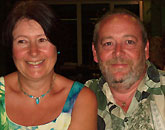Re-setting the heart's rhythm
For several months 48 year-old Nick Fisher thought his sleepless nights were being caused by acid indigestion, but his symptoms kept getting worse.
“It got to the stage where I couldn’t put up with it anymore,” he explains, “I’d just drop off to sleep then bang, I’d be awake again with my heart racing”.
He was waking up several times a night and his wife would comment how fast his heart was beating. During the day, he was drowsy through lack of sleep.

Unpredictable heart rate
As the episodes became more frequent, Nick’s GP referred him to his local hospital in Buckinghamshire. There, he was diagnosed with paroxysmal atrial fibrillation, a condition in which the heart starts racing at unpredictable times. During some episodes Nick’s pulse would reach the dangerously high rate of 191 beats per minute; he needed immediate treatment.
He was prescribed beta-blockers to slow the heart and warfarin to thin the blood. The drugs worked but their side effects also made a big impact. “I felt awful the whole time,” Nick explains. “It was almost like I was standing outside myself, everything felt very surreal. I thought, ‘am I going to be on these for the rest of my life’?”
Electrophysiology expertise
Understanding his concerns, his cardiologist referred him to Royal Brompton’s cardiology consultant Dr Jonathan Clague, an electrophysiologist who specialises in malfunctions of the electrical nerve impulses that control the co-ordinated beating of heart muscle.
Dr Clague felt confident that Nick was suitable for a procedure he uses to correct atrial fibrillation (mis-firing impulses in the heart). Radio-Frequency Ablation involves mapping in the left atrium, a process that takes around two hours. A device is inserted into the heart via a vein in the groin and using high-powered radio waves to very precisely correct the part that isn’t ‘firing’ properly.
New treatment
The treatment has been available for less than five years. “Dr Clague was straight down the line with me,” Nick says, “and he told me exactly what the risks were of the procedure not working. But I had done my research and I knew more about him than he did about me! If you’re going to put your life in someone’s hands you want them to be the best and I knew from his reputation that he was the best.”
Nick was admitted to Royal Brompton and the procedure was carried out under a general anaesthetic. As soon as he woke up Nick felt different: “I was bright-eyed and bushy-tailed and felt like I could run a marathon.”
To his delight, he was able to gradually came off the drugs that had caused him so much concern. His quality of life has improved and he feels lucky to have benefited from the expertise and care of the staff at the hospital. “I couldn’t fault the staff and their attention to detail. I’m confident that if ever there was a problem in future, it wouldn’t be a problem for the Royal Brompton”.
And he offers words of encouragement to those who are considering whether to go ahead with the same procedure. “I’d sign up and do it again if I had to,” he says “and my advice to anyone thinking about this is go for it!”
